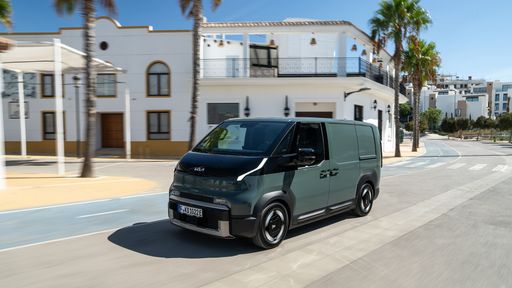Toyota Proace Bus vs Kia PV5 - Differences and prices compared
Compare performance (180 HP vs 163 HP), boot space and price (31600 £ vs 32800 £ ) at a glance. Find out which car is the better choice for you – Toyota Proace Bus or Kia PV5?
Costs and Efficiency:
Price and efficiency are key factors when choosing a car – and this is often where the real differences emerge.
Toyota Proace Bus has a minimal advantage in terms of price – it starts at 31600 £ , while the Kia PV5 costs 32800 £ . That’s a price difference of around 1256 £.
In terms of energy consumption, the advantage goes to the Kia PV5: with 19 kWh per 100 km, it’s distinct more efficient than the Toyota Proace Bus with 24.20 kWh. That’s a difference of about 5.20 kWh.
As for electric range, the Kia PV5 performs a bit better – achieving up to 416 km, about 73 km more than the Toyota Proace Bus.
Engine and Performance:
Under the bonnet, it becomes clear which model is tuned for sportiness and which one takes the lead when you hit the accelerator.
When it comes to engine power, the Toyota Proace Bus has a slight edge – offering 180 HP compared to 163 HP. That’s roughly 17 HP more horsepower.
In acceleration from 0 to 100 km/h, the Kia PV5 is evident quicker – completing the sprint in 10.60 s, while the Toyota Proace Bus takes 13.30 s. That’s about 2.70 s faster.
There’s also a difference in torque: Toyota Proace Bus pulls noticeable stronger with 400 Nm compared to 250 Nm. That’s about 150 Nm difference.
Space and Everyday Use:
Beyond pure performance, interior space and usability matter most in daily life. This is where you see which car is more practical and versatile.
Seats: Toyota Proace Bus offers convincingly more seating capacity – 9 vs 5.
In curb weight, Toyota Proace Bus is minimal lighter – 1835 kg compared to 1860 kg. The difference is around 25 kg.
In terms of boot space, the Kia PV5 offers convincingly more room – 1330 L compared to 0 L. That’s a difference of about 1330 L.
When it comes to payload, Toyota Proace Bus evident takes the win – 1265 kg compared to 790 kg. That’s a difference of about 475 kg.
Who wins the race in the data check?
The Kia PV5 is slightly ahead in the objective data comparison.
This result only shows which model scores more points on paper – not which of the two cars feels right for you.
Costs and Consumption
View detailed analysis
Engine and Performance
View detailed analysis
Dimensions and Body
View detailed analysis

Kia PV5
Toyota Proace Bus
The Toyota Proace Bus is a pragmatic people‑mover that swallows passengers and luggage with the kind of everyday practicality fleet managers and large families will appreciate. It may not thrill the enthusiast, but its sensible layout, sturdy build and Toyota badge make it a dependable, no-nonsense choice for anyone needing space and reliability rather than flash.
detailsKia PV5
The Kia EV5 is an exciting new entrant in the landscape of electric SUVs, promising a blend of style and innovation that captures attention. It boasts a sleek and modern design that aligns with Kia's evolving aesthetic identity, blending practicality with eye-catching details. With its foray into the electric vehicle segment, the EV5 is set to offer a highly competitive option for those looking to embrace sustainable mobility without compromising on comfort or tech features.
details



Costs and Consumption |
|
|---|---|
|
Price
31600 - 57100 £
|
Price
32800 - 38900 £
|
|
Consumption L/100km
6.5 - 6.7 L
|
Consumption L/100km
-
|
|
Consumption kWh/100km
24.2 - 24.4 kWh
|
Consumption kWh/100km
19 - 19.3 kWh
|
|
Electric Range
218 - 343 km
|
Electric Range
295 - 416 km
|
|
Battery Capacity
-
|
Battery Capacity
-
|
|
co2
0 - 177 g/km
|
co2
0 g/km
|
|
Fuel tank capacity
69 L
|
Fuel tank capacity
-
|
Dimensions and Body |
|
|---|---|
|
Body Type
Bus
|
Body Type
Cargo Van, Bus
|
|
Seats
5 - 9
|
Seats
2 - 5
|
|
Doors
4 - 5
|
Doors
-
|
|
Curb weight
1835 - 2140 kg
|
Curb weight
1860 - 2145 kg
|
|
Trunk capacity
0 L
|
Trunk capacity
1330 L
|
|
Length
4983 - 5333 mm
|
Length
-
|
|
Width
1920 mm
|
Width
1895 mm
|
|
Height
1890 mm
|
Height
-
|
|
Max trunk capacity
-
|
Max trunk capacity
-
|
|
Payload
825 - 1265 kg
|
Payload
455 - 790 kg
|
Engine and Performance |
|
|---|---|
|
Engine Type
Electric, Diesel
|
Engine Type
Electric
|
|
Transmission
Automatic, Manuel
|
Transmission
Automatic
|
|
Transmission Detail
Reduction Gearbox, Manual Gearbox, Automatic Gearbox
|
Transmission Detail
Reduction Gearbox
|
|
Drive Type
Front-Wheel Drive
|
Drive Type
Front-Wheel Drive
|
|
Power HP
136 - 180 HP
|
Power HP
121 - 163 HP
|
|
Acceleration 0-100km/h
13.30 s
|
Acceleration 0-100km/h
10.6 - 16.2 s
|
|
Max Speed
130 - 170 km/h
|
Max Speed
-
|
|
Torque
260 - 400 Nm
|
Torque
250 Nm
|
|
Number of Cylinders
4
|
Number of Cylinders
-
|
|
Power kW
100 - 132 kW
|
Power kW
89 - 120 kW
|
|
Engine capacity
2184 cm3
|
Engine capacity
-
|
General |
|
|---|---|
|
Model Year
2024 - 2025
|
Model Year
2025
|
|
CO2 Efficiency Class
A, F, G
|
CO2 Efficiency Class
A
|
|
Brand
Toyota
|
Brand
Kia
|
What drivetrain options does the Toyota Proace Bus have?
The Toyota Proace Bus is available as Front-Wheel Drive.
